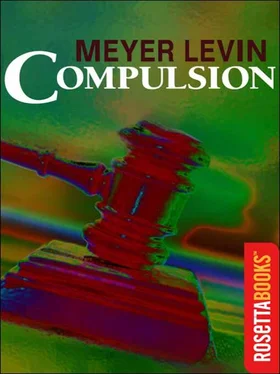Suddenly, police raids were taking place. Flophouses were combed, derelicts were picked up. Police Chief Schramm came back into the headlines by announcing that he had dropped the ransom theory and now favoured the pervert theory. ROUND UP ALL DEPRAVED, we headlined. Petty ex-convicts, floaters, queers were brought into the stations by the score, and we went and looked at them in the sour-smelling Canal Street lockup, the restless little men with puffy faces, the whisperers, the morons, as we called them. How many were kicked around, battered, abused? Who knew? Who cared?
Then Captain Nolan, chief of detectives, recaptured the headlines from the chief of police. “Dope will be found at the bottom of it all,” he announced in one of his exclusive interviews with the Tribune . And every dope addict in town was to be picked up and examined.
But as Nolan and Schramm failed to provide convincing suspects, our headlines were turned over more and more to State’s Attorney Horn and his eager staff of investigators. “The most important clue to appear so far,” we declared, had been provided by Horn, whose men had been questioning a railroad switchman oddly overlooked by the police. In Horn’s office we all listened to the switchman’s story. An elderly man with the scrubbed look of the intensely sober, he was quite convincing. On Wednesday night about midnight, he said, he had been driving home to Gary, and just past Hegewisch he had come upon a car stuck on a little side road. A dark sedan. It was a Nash or a Moon, not a Winton. He had given the car a push to get it back onto the road. Those people had been carrying a bundle of some kind, like something wrapped in a tent. He had even made a remark to the woman, “This is a hell of a time to go camping.” They had thanked him for the push. And one detail he remembered: their car had a broken front bumper.
And then Detective Chief Nolan issued an extraordinary statement: “I ask everybody in Chicago to look around and ask whether his neighbours, friends, or acquaintances showed signs of muddy clothes last Wednesday night, or were away from their usual haunts or callings last Wednesday afternoon or evening.”
“Hey, I saw mud on your shoes last Wednesday!” became the jest of the day, but Nolan’s invitation was followed by a new wave of telephone tips, letters, denunciations, arrests. Everyone was looking at his neighbour with strange eyes.
And at night, police pounced upon a group of people in a vacant lot at Cottage Grove and 44th – a few blocks from the Kessler home. There were two men and a woman. They had been acting strangely, burning something on the lot. And they carried a small bundle. It proved to be a shirt wrapped around something hard, which was nothing else than a broken typewriter! But it turned out to be an Oliver.
And near Aurora, police saw two cars stop. Their drivers got out, talked. A portable typewriter exchanged hands. The cars drove off in different directions. The police car chased one, and an officer commandeered a passing automobile to pursue the second fleeing vehicle. But the exchange proved to have taken place between a typewriter repairman and a respectable customer.
Neighbours of a mysterious redheaded woman reported that her room was filled with newspaper clippings about the murder. “I know all about the case,” they had heard her say. She was arrested as she was parking her old grey car. In the car was a shoemaker’s hammer, a weapon that might well have caused the death wounds on the boy’s head. She turned out to be a harmless eccentric.
Then we were haunting Steger’s block again. An anonymous telephone caller had informed the police that the dead boy’s clothing would be found “inside that block”. “We can’t afford to pass up anything,” Chief Schramm said, and the police combed the block. A woman was noticed acting suspiciously, running and peering under shrubs. But it was proved that she had merely lost her cat.
Meanwhile a truck filled with street labourers arrived, the block was closed off, and the men began breaking open the pavement. With the other reporters, I ran up and down the stairs that led to Steger’s apartment. Front and back doors were locked; blinds were drawn. It was rumoured he had been rearrested. One of the officers who was friendly to Tom, Lieutenant Cassidy, swore he didn’t know anything new about the school teacher. As for the digging operation, he only repeated our own guesses. “Maybe the sewer is stuffed up.” Maybe Paulie Kessler’s clothes would be found stuffed in the sewer.
The job continued into the darkness. Special lights were set up around the trench. In the crowd, the wisecracks flew, and the shocked, self-conscious giggles of flappers could be heard, as suggestions were made about what people might want to get rid of down the sewer. And in that same crowd, inevitably, Artie Straus had turned up with his satellite, Judd, hailing me, pausing to add a few horrors to the list, and swirling away among the watchers. I had a momentary impression of Artie’s voice laughing above some girlish shrieks, and then the sewer was finally opened. They found only a lot of muck.
In this muck, all the activity seemed to have come to a dead end. Of the hundreds of perverts and morons arrested and grilled, a score were still being held, among them an ex-policeman. We had taken to filling out our stories about them with the views of alienists, as we called them in those days. We quoted Dr. Arthur Ball, whose own grandson had been a playmate of Paulie Kessler and who declared that the killer would be found to be a degenerate of “the same mental type as Fitzgerald”, the sex maniac who had been hanged only two years before for mutilating a little girl.
After the alienists came the turn of the psychics. From Detroit, the police received a telegram signed by a Mme Charlotte High, who declared she had had a vision of the killing and could describe the killers.
Reese had me get her on long distance. A strange voice, breathless, masculine, poured out the detailed vision. “There are two men; one has a sort of grey streak in his hair. I see him hiding, in a big place, a hotel, in the south-west part of the city. The boy’s clothes are there. In my revelation I saw a car,” she continued. “It is not a Winton, as the police think, but a Buick. I traced the course of the car. A woman wrapped her skirt over the boy’s mouth to gag him, and he strangled. They went to a red frame house on Wabash Avenue at the end of the line where cars turn. In a day or two, someone will attempt to commit suicide. There will be a confession.”
And indeed on the next day someone did try to commit suicide. It was again the poor deranged druggist, Clement Holmes, who had escaped from the hospital. Now the news came from Louisville, where Holmes had been found in a rooming house, again nearly dead from poison. Police were waiting at his bedside for a confession. Only a thread of life remained. Would he live long enough to confess?
The report had come late in the day. Tom and I hurried back to the Bureau, hoping for the confession. If Holmes lived, Tom was to take the sleeper down to Louisville.
As we walked across the Loop, we felt that our job together on this story was drawing to an end. Somehow it was in the air – the murderer was about to be caught. We both felt, with our fagged-out nerves, that the thing was culminating.
We had worked together without rest all week. I had cut my classes, certain that in this assignment I was at last gaining my maturity. And with Tom I had experienced something I had never known before, a kind of partnership that I was to find rather rare even as I went on in my newspaper work. More and more as the week wore on, we had taken to keeping together, going out on the leads together instead of dividing them up. I knew only the barest facts about Tom Daly’s life, and he knew little more about mine. Yet we could curse each other out, call each other Hebe and Mick; each could tell when the other had reached a limit of fatigue, yet each would overcome his own fatigue to run down one more clue. And while Tom kidded me about my literary ambitions, I made in him the startling discovery that not all newspapermen intended to become writers; some thought of eventually becoming managing editors.
Читать дальше












